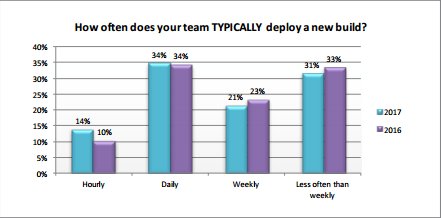
Developers and testing professionals want to speed up deployment times, but bugs are holding them back, according to a new report. Sauce Labs has released “Testing Trends in 2017: A Survey of Software Professionals,” which examined trends in web and mobile apps.
The report revealed that 28% of respondents want to deploy hourly, but no progress has been made when it comes to finding and fixing identified bugs fast. In addition, 14% of respondents revealed they aren’t deploying as fast as they want to.
“What is surprising from this report is the revelation that the speed in fixing identified bugs has remained stagnant,” said Charles Ramsey, CEO of Sauce Labs. “There is huge opportunity for teams to leverage automated testing to identify bugs earlier in the release cycle, immediately evaluate the bug with video playback and other assets, and share those test results across teams to fix them as quickly as possible.”
LogicHub comes out of stealth
A new company wants to help businesses defend against breaches. LogicHub has announced a US$8.4 million series A round of funding and a new approach to threat detection. Its security intelligence automation solution is designed to reduce the chance of a missed breach by more than 10x.
“At the end of the day, experienced cyber analysts are much better at detecting threats and triaging false alarms than the security tools available, but given the magnitude of the challenge, most teams can only inspect a tiny fraction of all security events collected in-depth,” said Kumar Saurabh, cofounder and CEO of LogicHub. “To combat this, LogicHub has found a way to capture and automate the knowledge and expertise of the most skilled cyber analysts, which results in much deeper threat detection.”
Google open-sources Chrome on iOS
Google is releasing the Chrome for iOS code into open source. The company has previously kept the code separate from the Chromium project because of the additional complexity that came with the platform. According to Google, after years of refactoring the code, it is now ready to be moved into open source.
“Given Chrome’s commitment to open-source code, we’ve spent a lot of time over the past several years making the changes required to upstream the code for Chrome for iOS into Chromium,” wrote Rohit Rao, developer for Google, in a blog post. “Today, that upstreaming is complete, and developers can compile the iOS version of Chromium like they can for other versions of Chromium. Development speed is also faster now that all of the tests for Chrome for iOS are available to the entire Chromium community and automatically run any time that code is checked in.”
Google’s Vulnerability Rewards Program in 2016
Google is releasing the details of its Vulnerability Rewards Program from 2016. According to the company, last year it awarded more than US$3 million total rewards, nearly $1 million each for Android and Chrome vulnerabilities, and more than $9 million since they founded the program in 2010.
In addition, more than 1,000 individual awards were granted to more than 350 security researchers in 59 countries. The biggest single reward was $100,000.
Red Hat and Boston University team up
Red Hat and Boston University are partnering up on a new collaborative research and education initiative. The new initiative will advance research and education on open-source and emerging technologies such as cloud computing, machine learning, automation, and Big Data.
The partnership is a part of a five-year agreement in which Red Hat will provide grants totaling $5 million. The agreement will include a Red Hat emerging technology lab at Boston University, Red Hat graduate fellows, and Red Hat postdoctoral and visiting scientist fellowships.
Dropbox sponsors Pyston releases v0.6.1
Pyston version 0.6.1 was released this week, with performance enhancements that make it 95% faster than CPython on standard benchmarks.
Dropbox is sponsoring this release, and this decision comes because of Dropbox’s ability to write performance-sensitive code in languages like Go. Also, the Pyston team has been spending more time on compatibility than expected, wrote Kevin Modzelewski, a software engineer for Dropbox.
He also wrote that on Dropbox’s server, Pyston is 10% faster on standard Python benchmarks. With this release, the team also announced that it is looking into upstreaming parts of its code back to Python, since the code is now based in theirs, he added.





